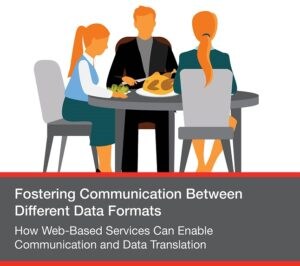How Web-Based Services Can Enable Communication and Data Translation
 Behind the excitement and joy of family gatherings, there is always a problem lurking in the corner—communication. The best way to navigate the murky waters of the dinner table is to remember there is a right and a wrong way to deliver information, based on the recipient. When you explain your job to your dear old aunt (not the one who’s a biopharmaceutical researcher… the other one), you will have to translate it, so she can conceptualize and understand what you are describing. This just makes sense, and most of us do it innately.
Behind the excitement and joy of family gatherings, there is always a problem lurking in the corner—communication. The best way to navigate the murky waters of the dinner table is to remember there is a right and a wrong way to deliver information, based on the recipient. When you explain your job to your dear old aunt (not the one who’s a biopharmaceutical researcher… the other one), you will have to translate it, so she can conceptualize and understand what you are describing. This just makes sense, and most of us do it innately.
You can avoid similar problems in a scientific organization by using standardized terminology to ensure the communication that takes place is clear to all parties. Though language can be agreed upon, there are some things over which you have no control—namely the language spoken by your machinery. Understandably, there has been a call for data standards in the bioinformatics industry. The lack of a data standard is a problem that grew slowly. Scientific vendors used their own standards to give themselves an edge in the market and ensure a vendor lock-in for scientific labs. Meanwhile, researchers were so buried under massive amounts of data that they didn’t realize their point-to-point solutions would eventually cause headaches.
The work by the Allotrope Foundation to encourage a data standard would be a boon for research if it ever came to fruition. In some technological areas a data standard is absolutely necessary. For instance, web browsers from different companies can all traverse the web, allowing you to read websites on your screen. They all run using the same HTTP and HTML standards, otherwise the world wide web would cease to be. This is a data standard that is necessary for both the consumer and the software producer.
Microservices to Enable Communication
Having all data in the same format would improve lab efficiency and collaborations, but until that happens, we need to find a way to enable this communication as simply as possible. Instead of messy integrations, we can use already established microservices available in the cloud to work with containerized translators and converters. These containerized services can be chained together to allow proper understanding of data.
As with other services in the cloud, containerized services can be used when needed and scale according to your uses. For instance, individual steps in a sequence analysis pipeline can be placed into containerized microservices. Next-generation sequencing labs have already moved in this direction. Each step in the analysis chain calls to containerized microservices. However, each microservice may receive and produce disparate data formats. Instead of forcing all these services to speak the same language, other translation services can be added to the chain to provide the necessary interpretations.
We see containerized microservices as an integral part of today’s solutions for data management. We are evolving our Thermo Fisher™ Platform for Science™ software to ensure your chained microservices are first class citizens of your pipelines for data management, workflows and analysis.
We expect a platform that enables you to analyze your information easily, consistently, and securely using already existing services. With these atomic and modularized services, the need for standardized data becomes less important and scientific research will reap the benefits.
Now think back to the family dinner table… Imagine inviting another guest who excelled at translating “scientific speak” into common language. That person sitting in the seat (or microservices container) next to your aunt might be the key to explaining the topics discussed over dinner. Not only does ensuring communication and understanding make you a good host, it makes you a great scientific data manager as well.
Leave a Reply